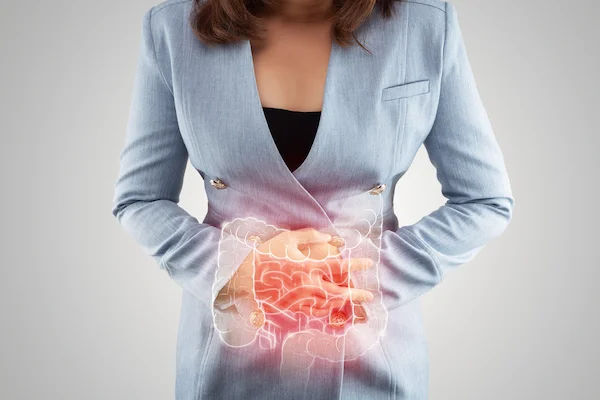Understanding Inflammatory Bowel Syndrome (IBS)
Know about the inflammatory bowel disease syndrome, causes, symptoms, how it affects health and tips to manage IBS and more.

Written by Dr. J T Hema Pratima
Reviewed by Dr. Dhankecha Mayank Dineshbhai MBBS
Last updated on 4th Aug, 2025

Introduction
Living with digestive discomfort can be frustrating and confusing, especially when symptoms like bloating, abdominal pain, and irregular bowel movements become a regular part of your life. If you’ve been experiencing these issues, you might be dealing with Inflammatory Bowel Syndrome (IBS).
While IBS is a common condition, it can significantly impact your daily life. The good news is that with the right understanding and management, you can take control of your symptoms and improve your quality of life.
What is IBS?
Inflammatory Bowel Syndrome (IBS) is a chronic digestive disorder that affects the large intestine (colon). Unlike Inflammatory Bowel Disease (IBD), which involves inflammation and damage to the digestive tract (such as in Crohn’s disease or ulcerative colitis), IBS does not cause permanent harm to the intestines. However, it can still be uncomfortable and disruptive.
IBS is a functional gastrointestinal disorder, meaning there’s no visible structural problem, but the way your gut functions is altered. This leads to symptoms like cramping, bloating, diarrhea, and constipation.
Consult a top Gastroenterologist for the best advice
Common Symptoms of IBS
IBS affects people differently, but some of the most common symptoms include:
Abdominal pain or cramping (often relieved after a bowel movement)
Bloating and gas
Diarrhea (IBS-D) – frequent loose stools
Constipation (IBS-C) – difficulty passing stools
Mixed bowel habits (IBS-M) – alternating between diarrhea and constipation
Mucus in stool
Feeling of incomplete bowel movement
These symptoms can come and go, sometimes worsening during periods of stress or after eating certain foods.
What Causes IBS?
The exact cause of IBS is not fully understood, but several factors may contribute:
1. Gut-Brain Connection – The brain and digestive system are closely linked. Stress, anxiety, or depression can trigger or worsen IBS symptoms.
2. Abnormal Gut Motility – The muscles in the intestines may contract too quickly (causing diarrhea) or too slowly (leading to constipation).
3. Gut Sensitivity – Some people with IBS have a more sensitive digestive system, making them feel pain or discomfort more easily.
4. Bacterial Imbalance – Changes in gut bacteria (microbiome) may play a role.
5. Food Triggers – Certain foods (like dairy, gluten, or fatty foods) can aggravate symptoms.
How Does IBS Affect Your Health?
While IBS doesn’t cause permanent damage to the intestines, it can still impact your life in several ways:
Discomfort and Pain – Frequent abdominal pain can make daily activities difficult.
Dietary Restrictions – You may need to avoid certain foods to prevent flare-ups.
Emotional Well-being – Chronic symptoms can lead to stress, anxiety, or embarrassment.
Sleep Disturbances – Nighttime symptoms can disrupt sleep.
The key is to identify triggers and manage symptoms effectively to lead a comfortable life.
Tips for Managing IBS
1. Dietary Changes
What you eat plays a big role in managing IBS. Here are some helpful tips:
Follow a Low-FODMAP Diet – FODMAPs are certain carbohydrates that can trigger IBS symptoms. A dietitian can help you identify and eliminate high-FODMAP foods (like onions, garlic, beans, and certain fruits).
Increase Fiber Gradually – Soluble fiber (found in oats, bananas, and carrots) can help with constipation, but too much insoluble fiber (like in whole grains) may worsen bloating.
Stay Hydrated – Drinking enough water helps with digestion and prevents constipation.
Limit Trigger Foods – Common triggers include caffeine, alcohol, spicy foods, dairy (if lactose intolerant), and artificial sweeteners.
2. Stress Management
Since stress can worsen IBS, relaxation techniques can help:
Practice Deep Breathing or Meditation – Helps calm the nervous system.
Exercise Regularly – Physical activity improves digestion and reduces stress.
Get Enough Sleep – Poor sleep can make symptoms worse.
3. Probiotics and Supplements
The probiotics and supplements are useful as:
Probiotics (found in yogurt or supplements) may help balance gut bacteria.
Peppermint Oil (in capsule form) can reduce bloating and cramping.
4. Medications (If Needed)
If lifestyle changes aren’t enough, your doctor may recommend:
Antispasmodics – For cramping and pain.
Laxatives or Anti-diarrheals – For constipation or diarrhea.
Low-dose Antidepressants – Sometimes prescribed to reduce gut sensitivity.
When to See a Doctor?
While IBS is manageable, some symptoms may indicate a more serious condition. Seek medical help if you experience:
Unexplained weight loss
Blood in stool
Severe or persistent diarrhea
Fever or vomiting
If you suspect you have IBS, consulting a gastroenterologist can help confirm the diagnosis and create a personalized treatment plan.
Final Thoughts
Irritable bowel syndrome is a functional disorder affecting the intestine which results in damage and inflammation of the gut. The symptoms include constipation, incomplete emptying of gut contents etc. it can be due to some disturbance in gut-brain connection, gut sensitivity etc. implementing changes like use of medications, stress management and healthy eating habits can help in management of IBS.
Consult a top Gastroenterologist for the best advice
Consult a top Gastroenterologist for the best advice
Dr. Umakanth Eskala
Gastroenterology/gi Medicine Specialist
16 Years • DM (GASTRO)
Visakhapatnam
Apollo 24|7 Clinic - Andhra Pradesh, Visakhapatnam

Dr Rohit Sureka
Gastroenterology/gi Medicine Specialist
15 Years • MBBS, DNB General Medicine, DNB Gastroenterology
Jaipur
Apollo 247 virtual - Rajasthan, Jaipur

Dr. Paramesh K N
Gastroenterology/gi Medicine Specialist
16 Years • MBBS, MS ( General Surgery), DNB ( Surgical Gastroenterology)
Hyderabad
Sprint Diagnostics Centre, Hyderabad

Dr Harish K C
Gastroenterology/gi Medicine Specialist
15 Years • MBBS MD DM MRCP(UK) (SCE-Gastroenterology and Hepatology)
Bangalore
Manipal Hospital, Bangalore

Dr Jatin Yegurla
Gastroenterology/gi Medicine Specialist
11 Years • MD (PGI), DM (AIIMS Delhi), FAGIE (AIIMS Delhi), ESEGH (UK), Gold Medalist
Nanded
Apollo Hospitals Information Centre,Dr Rajendra Patil, Physiotheraphy Centr, Nanded


